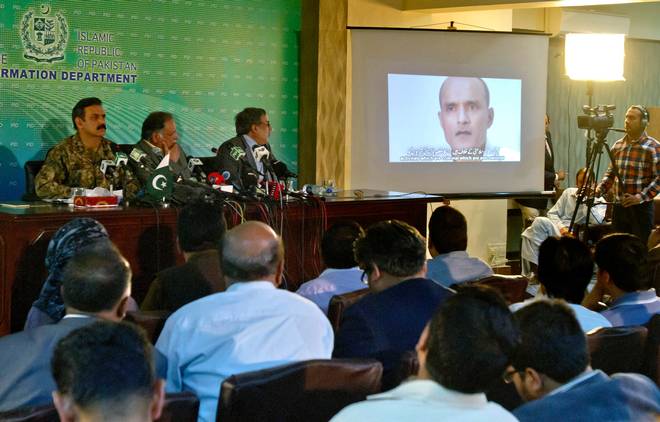THE HINDU JAN1,2018:Kulbhushan Jadhav: the story so far
|
|
|
|
Who is Kulbhushan Jadhav? |
Kulbhushan Sudhir Jadhav (also spelled Kulbhushan Yadav, alias (alleged) Hussain Mubarak Patel) is an Indian national who was arrested in Balochistan, Pakistan, over charges of terrorism and spying for India's intelligence agency---Research and Analysis Wing (RAW). The Pakistani government states that he was a serving commander in the Indian Navy who was involved in subversive activities inside Pakistan, and was arrested on 3 March 2016 during a counter-intelligence operation in Balochistan. The Indian government recognises Jadhav as a former naval officer, but denies any current links with him and maintains that he took premature retirement and was possibly abducted from Iran. On 10 April 2017, Jadhav was sentenced to death by a Field General Court Martial (FGCM) in Pakistan On 18 May 2017, the International Court of Justice stayed the hanging, pending the final judgement on the case
|
|
Kulbhushan Jhadav and Vienna Convention and Diplomatic Immunity |
A foreign diplomat (like a local citizen) can be charged for all offenses committed, whether big or small. The only difference is that he or she (upon verification of diplomatic identity) may not be arrested, held in legal custody, or made a defendant in a court case. Instead, he or she is deported through due process to his or her home country to face prosecution under its laws. Diplomats who are serious offenders or indulge in activities contrary to their official status may be declared “persona non grata” and be forced to go back within a few days or even hours. |
|
VIENNA CONVENTION ON DIPLOMATIC RELATIONS |
The Vienna Convention on Diplomatic Relations (1961) is a treaty that defines the framework for the conduct of diplomatic relations between countries. There is also a separate convention on Consular Relations signed in 1963. These treaties were developed under the auspices of the United Nations. They apply not only to diplomats but to personnel from the military departments, both military and civilian, who are in the country under the authority of the Chief of Mission. Vienna Convention on diplomatic relations contains plethora of articles and provisions, most prominent among them have been summarised below:
Article 9: The host nation at any time and for any reason can declare a particular member of the diplomatic staff to be “persona non grata”. The sending state must recall this person within a reasonable period of time, or otherwise this person may lose their diplomatic immunity.
Article 22: The premises of a diplomatic mission, such as an embassy, are inviolate and must not be entered by the host country except by permission of the head of the mission. Furthermore, the host country must protect the mission from intrusion or damage. The host country must never search the premises, nor seize its documents or property. Article 30 extends this provision to the private residence of the diplomats.
Article 27: The host country must permit and protect free communication between the diplomats of the mission and their home country. A diplomatic bag must never be opened even on suspicion of abuse. A diplomatic courier must never be arrested or detained.
Article 29: Diplomats must not be liable to any form of arrest or detention. They are immune from civil or criminal prosecution, though the sending country may waive this right under Article 32: Under Article 34, they are exempt from most taxes, and under Article 36 they are exempt from most customs duties. Article 31 1c: Actions not covered by diplomatic immunity: professional activity outside diplomat's official functions. Article 37: The family members of a diplomat that are living in the host country enjoy most of the same protections as the diplomats themselves. Working Note: As of June 2013, there are 189 state parties to the convention. The states which have neither signed nor ratified the convention are: Antigua and Barbuda, Cook Islands, Niue, Republic of Palau, Solomon Islands, South Sudan, Republic of Vanuatu and the states with limited recognition (such as Israel, Taiwan, Kosovo, and Western Sahara). There are no states that have signed the treaty but have not ratified it.
|
|
International Court of Justice |
The International Court of Justice (abbreviated ICJ; commonly referred to as the World Court) is the principal judicial organ of the United Nations (UN).
It settles legal disputes between member states and gives advisory opinions to authorized UN organs and specialized agencies.
It comprises a panel of 15 judges elected by the General Assembly and Security Council for nine-year terms.
It is seated in the Peace Palace in The Hague, Netherlands. |
|
www.jineshiasacademy.com |
|
 Kulbhushan Jadhav: the story so far
Kulbhushan Jadhav: the story so far